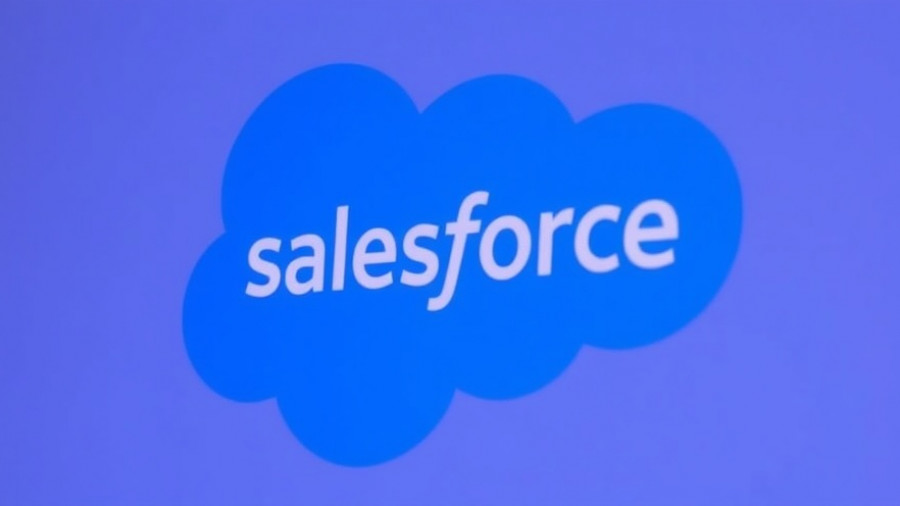
Salesforce's AI Copyright Controversy: A Call for Fair Compensation
As the realm of artificial intelligence technology expands, a pressing legal battle is emerging involving Salesforce—a prominent cloud-computing firm accused of copyright infringement. Authors Molly Tanzer and Jennifer Gilmore are spearheading a class-action lawsuit against Salesforce, claiming that the company unlawfully utilized thousands of their written works to teach its xGen AI software. This bold move reflects wider concerns within the authorship community regarding intellectual property rights in the age of AI.
Background: A Growing Wave of Lawsuits Against Tech Giants
The complaint, initiated by Tanzer and Gilmore, is part of a burgeoning trend of litigation against major tech corporations like OpenAI, Microsoft, and Meta Platforms. As AI models increasingly rely on vast datasets derived from published works, copyright holders are realizing that their creations are being exploited without due credit or compensation. Legal expert Joseph Saveri—a key player in this battleground—emphasizes the need for transparency from tech companies regarding the materials they use for AI training.
The Role of Intellectual Property in AI Development
At the heart of these allegations lies the critical issue of intellectual property rights. Authors are rightly concerned that their works serve as the foundational bedrock from which AI systems like Salesforce's xGen are built. As highlighted in the lawsuit, these models have the potential to greatly influence various industries but often at the expense of content creators. The notion that tech firms should provide fair compensation for using copyrighted material is one that resonates profoundly with many who rely on the protection of their creative output.
Salesforce’s Leadership and Public Statements on AI Ethics
Interestingly, Salesforce’s CEO Marc Benioff has previously criticized AI companies for utilizing "stolen" content, pointing out that paying content creators should be a straightforward task. This juxtaposition forms the basis of the plaintiffs' argument: if the CEO acknowledges the misuse of creative works, why, then, should his own company be seen as exempt from accountability? This critical reflection not only questions Salesforce’s practices but also underscores the broader ethical dilemmas faced by technology firms today.
Potential Implications for the Tech Industry
This lawsuit is symptomatic of growing tensions between traditional content creators and modern tech companies that harness those works for profit. If successful, the plaintiffs' claims may set a precedent, prompting tech giants to overhaul their data acquisition strategies and approach to copyright compliance. The outcome of this case could echo throughout the burgeoning AI landscape, influencing future litigation and possibly redefining the interaction between creative industries and technology.
Legal Insights and Challenges Ahead
Legal experts suggest that tech companies will face increased scrutiny as more authors and content creators recognize their rights and the potential for monetary compensation. The current legal framework surrounding copyright and AI remains murky, requiring urgent reforms to protect intellectual property in this rapidly evolving sector. For instance, understanding the claims process against large corporations like Salesforce could empower more individuals to seek justice for their grievances.
Confronting Common Misconceptions About AI Copyright Issues
A prevalent misconception is that technology firms can exploit literary works freely, assuming that digitization dilutes ownership rights. However, this perspective overlooks the fundamental principle of copyright law, which is designed to safeguard the interests of creative individuals. Educating the public about these rights is essential, as is raising awareness about the urgent need for legal protections against abusive practices in AI training.
Statistical Data on Copyright Litigation in the Tech Space
Recent data indicates a sharp increase in copyright infringement cases, with over 20 high-profile lawsuits concerning AI and copyright filed in the past year alone. This surge highlights a growing dissatisfaction among authors who feel their works are being commandeered by AI firms without recourse. As legal battles continue to unfold, more data will emerge, helping to shape public understanding and potentially influencing policy reforms.
What This Means for the Average Consumer
The challenge posed by copyright misuse in AI technologies is not only a concern for authors but also a matter of public interest. Consumers should find it increasingly relevant to support systems that recognize and uphold the rights of creators. In an era where rapid technological advancements often supersede ethical considerations, understanding one's rights as a consumer—and as a creator—could prove essential in navigating this landscape.
In conclusion, the Salesforce lawsuit serves as a crucial reminder of the importance of intellectual property rights in the Age of AI. It prompts a broader dialogue on the necessity for all tech companies to operate transparently and fairly compensate their contributors. For those involved or interested in navigating similar challenges, staying informed about the evolving legal landscape is critical.
 Add Row
Add Row  Add
Add 




Write A Comment